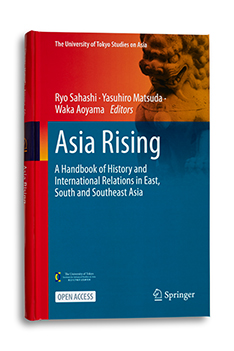書籍紹介
Ryo Sahashi, Yasuhiro Matsuda and Waka Aoyama (eds.)
Asia Rising : A Handbook of History and International Relations in East, South and Southeast Asia, Springer
編者からの紹介

アジアの歴史や国際関係は、今やアジア域内に留まらず世界各地で教えられています。発展するアジアへの関心が高まっていますが、大学で一般的に指定される教科書は欧米の学者によって書かれたものが中心です。それらは植民地化以前のアジアの発展や、脱植民地化、冷戦のアジアにおける文脈よりもグローバルな力学を重視する傾向がありました。また、英語での文献を挙げることが多く、アジア現地の資料や研究成果を十分に紹介するものでもありません。こうした問題を克服するため、アジア発のアジア研究の手引きを作成しようとしたのが本書です。日本の近代化や拡大がアジアに与えた影響、また20世紀後半における民主化や地域主義の高まり、そして安全保障の複雑化にもそれぞれ章を割いています。日本を代表する研究者27名が執筆し、東洋文化研究所の教員3名が編集にあたりました。本書によって、アジアに関心を持つ域内外の多くの人々が、アジアにおける研究成果を踏まえて、出来事のローカルな文脈やそれとグローバルとの連関を確認し、多角的に研究を深めて欲しいと願っています。オープンアクセス ですぐにご覧いただけますので、ぜひご一読ください!
The history and international relations of Asia are now taught not only within the region but across the globe. As interest in the dynamic development of Asia grows, the textbooks commonly assigned in universities remain predominantly authored by Western scholars. These works often prioritize global dynamics over the historical developments within Asia itself, such as the region's pre-colonial growth, decolonization, and the specific contexts of the Cold War in Asia. Moreover, they frequently rely on English-language sources, offering limited engagement with local materials and research produced within Asia. This book aims to address these issues by creating a guide to Asian studies from an Asian perspective. It dedicates chapters to topics such as Japan’s modernization and its impact on the region, the rise of democratization and regionalism in the latter half of the 20th century, and the increasing complexity of security issues. With contributions from 27 leading Japanese scholars and edited by three faculty members from the Institute of Advanced Studies on Asia, this volume aspires to offer a comprehensive resource that allows readers, both within and beyond Asia, to explore the local contexts of events, understand their global connections, and deepen their research with a multifaceted approach.
(You have full access to this open access Book)
目次
| Introduction: What is Asia? | Masashi Haneda | |
| 1 | Prosperity in Asia | Satoshi Hirano, Hiroyuki Mashita, Yijiang Zhong, Masashi Haneda |
| 2 | Colonization and Imperialism | Toshie Awaya, Yuji Tsuboi |
| 3 | East Asia and Imperialism | Takashi Okamoto, Shin Kawashima, Kaoru Iokibe |
| 4 | Japan’s Expansion into Asia | Yuichi Sasaki |
| 5 | Colonialism and War-Torn Asia | Masahiro Wakabayashi, Aiko Kurasawa, Takashi Mitsui |
| 6 | From the Concept of Postwar Order to the Cold War System | Yasuhiro Matsuda, Ayako Kusunoki, Tadashi Kimiya |
| 7 | Decolonization | Kazuya Nakamizo, Hiroyoshi Kano |
| 8 | The Cold War in Asia After 1953 | Toshihiko Aono |
| 9 | Experiencing Development: The Resistance and Adaptation of Thailand Over Half a Century | Pattajit Tangsinmunkong, Jin Sato |
| 10 | Economic Development in Korea and China | Tadashi Kimiya, Akio Takahara |
| 11 | Democratization in Asia | Yuko Kasuya |
| 12 | Japan’s Economic Growth and Engagement in Asia | Akihiko Tanaka |
| 13 | The Rise of China in Asia | Rumi Aoyama |
| 14 | Opposition and Cooperation: The Asia Pacific After the Cold War | Ryo Sahashi |
| 15 | Regional Concepts and Regionalism in Asia | Mie Oba |
情報
Ryo Sahashi, Yasuhiro Matsuda and Waka Aoyama (eds.)
Asia Rising:A Handbook of History and International Relations in East, South and Southeast Asia (The University of Tokyo Studies on Asia)
Springer, 304 pages, 2024.9, ISBN: 978-981-97-4374-2
東洋文化研究所教員の著作

